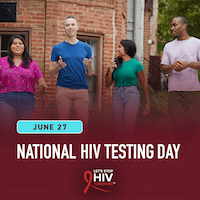
HIV testing has made great strides over the decades. Most people with HIV in the U.S. know their serostatus and are in care.
Progress is likely to continue as there are more options for getting tested. The theme for 2023 National HIV Testing Day is Take the Test & Take the Next Step. According to CDC, this was selected as it "highlights the power of HIV testing to give people the information they need to make decisions to keep themselves and their partners healthy, regardless of their test results."
HRSA Recognizes National HIV Testing Day - HIV.gov 6/26/23
Trends in HIV Diagnoses
As the following CDC chart on new HIV infections demonstrates, recent years have seen a significant decline in new HIV infections.

The value of HIV testing is clear. Getting on antiretroviral treatment and achieving an undetectable viral load benefits one's own health and effectively eliminates the risk of transmitting HIV to others. These benefits are expressed in Ending the HIV Epidemic: A Plan for America, whose first pillar is to "diagnose all people with HIV as early as possible," and its second pillar: "treat people with HIV rapidly and effectively to reach sustained viral suppression."
RWHAP: HIV Testing and Care Engagement
A wide range of HIV testing and care engagement interventions have been developed over the decades by HRSA's Ryan White HIV/AIDS Program (RWHAP). Below is a summary of select efforts.
Best Practices
RWHAP-funded agencies have developed various interventions designed to quickly transition individuals from diagnosis to care. A number of test-and-treat projects are presented in the Best Practices Compilation of interventions that have been shown to improve HIV outcomes in a "real world" setting and can be replicated by other programs. One highlight is Addressing STIs: Ask. Test. Treat. Repeat,, which includes four intervention components: audio computer-assisted self-interview sexual history taking, patient self-collection of test specimens, sexual and gender minority welcoming indicators, and provider training.
Rapid ART
Rapid ART means beginning anti-retroviral treatment as soon as possible after an HIV diagnosis in order to achieve viral suppression that benefits the individual and prevents HIV transmission to others. See our rapid ART topic page, featuring models developed by RWHAP agencies as presented in Rapid ART: An Essential Strategy for Ending the HIV Epidemic, by TAP-in, the HRSA TA provider for EHE jurisdictions.
From the Field: Testing and Emergency Departments
Our Conference Presentations database includes Ryan White conference sessions from HRSA and front-line providers on various HIV testing interventions. Notable are sessions on testing and linking people to care via emergency departments. See How AETCs, Emergency Departments, and Health Jurisdictions Can Identify and Treat HIV, HCV, and Syphilis (2022 Ryan White Conference) and Collaborations among AETCs, Emergency Departments, and Health Jurisdictions to Identify and Treat HIV, HCV, and Syphilis (2020 Ryan White Conference).
See more in our HIV Testing and Diagnosis and Rapid ART topic pages.
Clinic-Focused HIV Testing
Many of the RWHAP's clinic-based HIV testing efforts have been developed under the program's AIDS Education and Training Centers (AETC) Program, the clinician-training arm of the RWHAP. Highlights include:
- Resources for Clinicians. The AETC National Coordinating Resource Center produced the Immediate ART: Quick Guide for Clinicians in 2019 and offers much more on their topic page on the HIV Continuum of Care's Step 2: Identifying Cases through HIV Testing & Diagnosis. Regional and local AETCs also provide training on testing-related topics for clinicians.
- Addressing STIs: Ask. Test. Treat. Repeat. Also highlighted above, this project presents tools to help clinics improve screening, testing, and treatment of common bacterial STIs among people with HIV or at risk for HIV.
- National HIV Curriculum. This online training tool's section on Screening and Diagnosis covers HIV testing in depth, including testing recommendations, new diagnostic tests and how to address the complexities of test interpretation. Section topics include: Epidemiology of HIV: HIV Screening Recommendations; HIV Diagnostic Testing; Acute and Recent HIV Infection; and Linkage to HIV Care.
- National Clinician Consultation Center. The AETC NCCC provides clinician-to-clinician expert advice on a broad range of HIV topics, including testing, care management, PrEP, PEP and more.